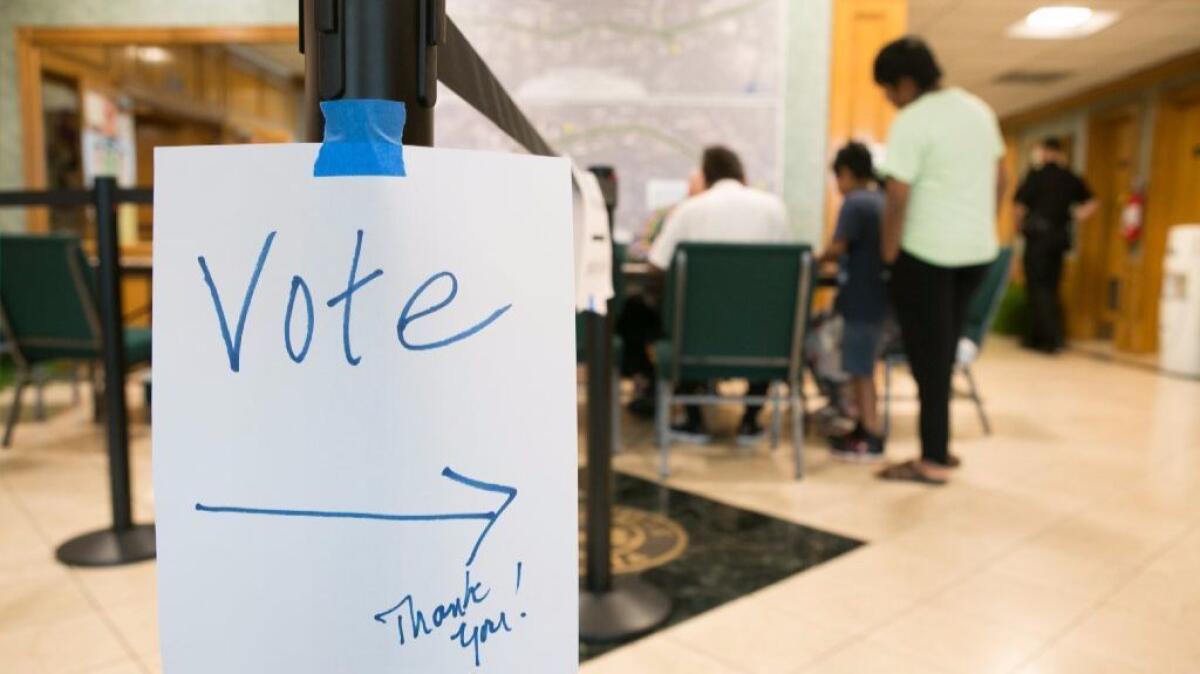Kris Kobach says Trump’s voter fraud panel will keep voter data secure. Some states aren’t buying it

- Share via
After weeks of legal battles and bipartisan pushback from top election officials nationwide, President Trump’s voter fraud commission has renewed a message for the states: It’s safe to pass along your data about voters.
“Individuals’ voter registration records will be kept confidential and secure throughout the duration of the commission’s existence,” Kris Kobach, vice chairman of the commission, wrote in a letter sent late Wednesday to all 50 secretaries of state.
Even so, by Thursday, much of the criticism that greeted an earlier request from the commission was repeated by election officials and activists, who have expressed concerns about privacy and have called the panel both a sham created by an insecure president and a tool to suppress votes.
Trump — without evidence — has repeatedly alleged that 3 million to 5 million illegal votes were cast in last year’s presidential election. (Trump prevailed in the electoral college, while Democrat Hillary Clinton won the popular vote by about 3 million votes.)
The letter from Kobach is the second in less than a month requesting that secretaries of state submit voter data to the so-called Presidential Advisory Commission on Election Integrity.
On June 28, Kobach, a Republican who as Kansas’ secretary of state has helped create some of the strictest voter ID laws in the country, wrote to top election officials requesting, among other things, names, addresses and the last four digits of Social Security numbers.
In the days after Kobach’s June 28 letter, 21 states and the District of Columbia declined to provide any data, according to a tally by the Brennan Center for Justice, a public policy institute that focuses on, among other things, voting rights.
Other states, citing local laws, agreed to provide some, but not all of the data requested. States have been especially cool to providing even a portion of a person’s Social Security number.
On Thursday, Minnesota Secretary of State Steve Simon said his position of not releasing information on his state’s nearly 4 million voters has not changed.
“I have serious doubts about the commission’s credibility and trustworthiness, and I fear it risks becoming a partisan tool to shut out millions of eligible American voters,” Simon, a Democrat, said.
In recent weeks, a flurry of lawsuits surrounding privacy issues have ensued. This week a federal court ruled against the Electronic Privacy Information Center, a public interest research group that had sought a temporary restraining order to block the commission’s request for data.
At its core, the court rejected arguments that the commission’s request for certain voter data violated Americans’ privacy and that the commission did not follow constitutional proceeding. The research group has appealed the ruling.
Kobach has said the commission aims to improve voting systems and ensure the integrity of elections. Critics have questioned the commission’s purpose as studies have consistently shown that voter fraud is almost nonexistent.
Fear of how the commission might use voter data is already prompting some people to take their names off voter rolls.
Amber McReynolds, director of elections for the city and county of Denver, said that her office has been flooded with calls and emails from concerned voters and that it has seen an uptick in voter registration withdrawals in recent weeks.
Since Kobach’s original letter, McReynolds said, nearly 1,000 people — out of about 600,000 registered voters in Denver County — had withdrawn their registration.
“Normally, we see four or five in a given week,” she said. “It’s now been hundreds in a week.… That’s concerning.”
In Colorado, nearly 4,000 people statewide have canceled their voter registrations since Kobach’s June 28 letter.
Tiffany Quay Tyson, 48, is a writer who lives in Denver and was among those to reach out to McReynolds’ office. Tyson did not withdraw her registration but did say she was concerned about the commission.
“I can’t really see why the commission would need things like Social Security numbers or addresses,” she said.
Last week, U.S. Sen. Michael Bennet, citing this figure, wrote to the commission calling for it to disband.
“This commission was formed as a result of delusion, conspiracy theories and truly ‘fake news,’” Bennet wrote. “But it is having a very real and dramatically chilling effect on voter participation.”
Colorado Secretary of State Wayne Williams, a Republican, said he will give some information to the commission — such as party affiliation, full name, address, year of birth and vote history — because the data are already publicly available.
“It’s my hope that citizens who withdrew their registration will re-register, particularly once they realize that no confidential information will be provided and that the parties and presidential candidates already have the same publicly available information from the 2016 election cycle,” he said Thursday.
Kobach’s commission — a bipartisan group that consists of about a dozen current and former secretaries of state, clerk and recorders and judges — held its first meeting July 19 in Washington, D.C. The panel plans to continue gathering in the months ahead and is scheduled to send a written report to Trump sometime next year.
Twitter: @kurtisalee
ALSO
What you need to know about President Trump’s voter fraud commission
President Trump says it’s illegal to be registered to vote in two states — but he’s wrong
More to Read
Sign up for Essential California
The most important California stories and recommendations in your inbox every morning.
You may occasionally receive promotional content from the Los Angeles Times.











